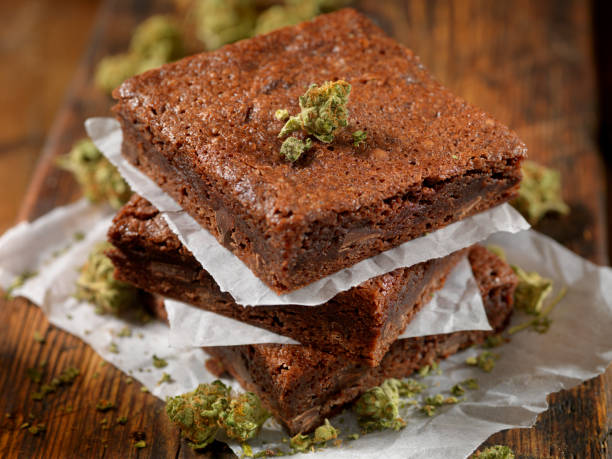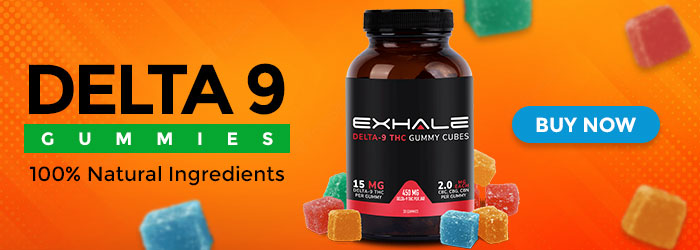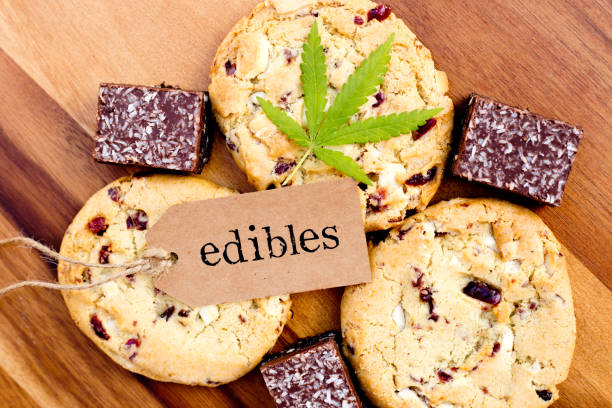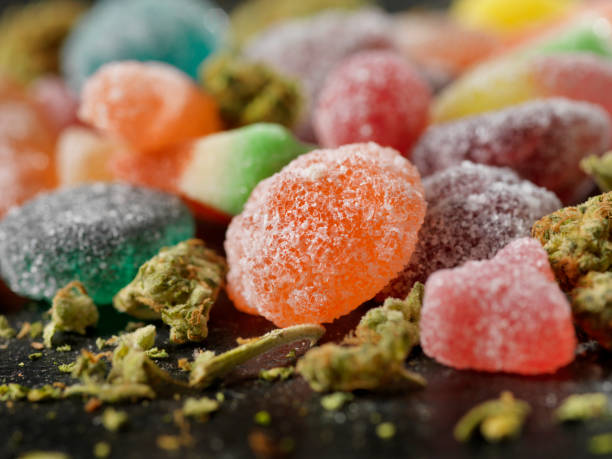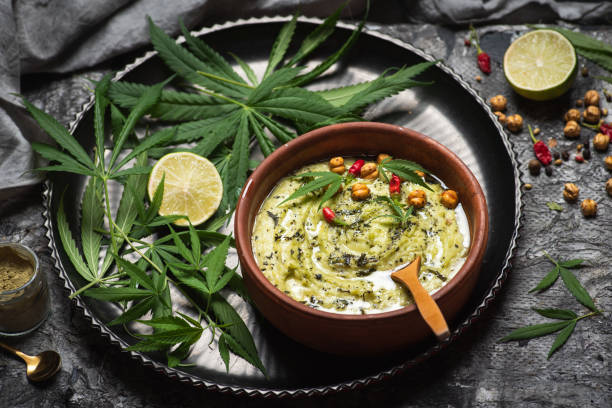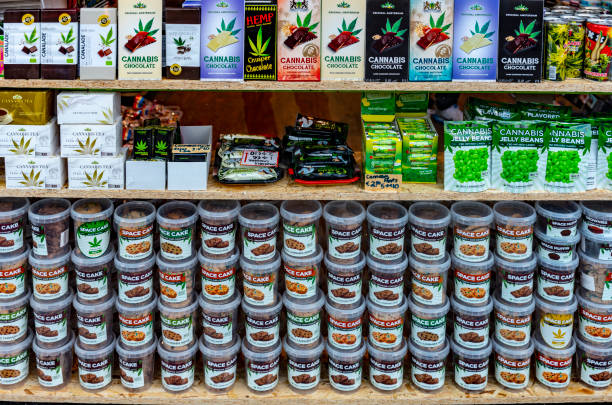You can purchase edibles like a bar of chocolate or gummies from legal markets and get home excited and eager to give it a trial and feel its effect. You sit back and wait for the effects to kick in as you eat edibles- but no effects are felt even after three hours.
On average, cannabis edible effects kick from 30 minutes to about one hour after ingestion. After eating, you will get a peak high after two hours, and the muted effects can persist for more than five hours.
If you eat small amounts, the effects won’t last for long, and you will be back to normal as fast as six hours after eating an edible. However, the effects will last longer if you eat higher doses of these weed edibles (above 20 milligrams).
What Are Cannabis Edibles?
These are drinks or food that have raw cannabis extract. Edibles from a cannabis plant come in several forms, including CBD gummies, baked goods, hard candies, etc.; some people can prepare their own edibles at home. Homemade edibles products have cannabinoids, a compound available in cannabis, and they affect your body and mind when consumed.
Tetrahydrocannabinol (THC) is a cannabinoid that offers a euphoric effect. Cannabidiol (CBD) is a non-intoxicating cannabinoid that offers some therapeutic benefits. There are more varieties of edible cannabis products.
How Long Do Edibles Effects Take To Kick In?
As said earlier, cannabis comprises tetrahydrocannabinol (THC) and cannabidiol compounds, and the THC compound is responsible for the high effect.
THC edibles effects from cannabis-infused edibles are slower to kick in though they last longer, unlike inhalation. The reason being smoking weed is quickly absorbed into your bloodstream and disseminated fast to your brain. With marijuana edibles, they need to enter your digestive system first.
Some factors affecting how soon a person will feel the effects after eating edibles include non-cannabis ingredients in edibles, metabolism, gender, body weight, and last eating.
Consuming below your tongue (sublingual absorption) is faster because it bypasses your digestive system and is absorbed straight into your bloodstream. Thus, products like tinctures and lollipops are placed below your tongue and offer immediate effects.
Edibles need about an hour for the effects to kick in. Moreover, the exact time depends on different factors, including the active ingredients. Edible products with higher THC concentration take effects quicker.
Remember that edibles with CBD only don’t offer a psychoactive effect. You won’t experience the “high feeling” normally linked with edibles infused with THC. As a result, it’s harder to know when CBD edible products’ effects have kicked in. With all varieties of products, the onset time depends on where the edibles are broken down and absorbed into your bloodstream.
When you eat an edible and stay for three hours without feeling any effects, your body doesn’t react to them, or your edible is ineffective.
Why Are Edibles Not Getting Me High?
Nowadays, edibles come in all sizes, shapes, plus flavors; unlike there before, they were just pot brownies. Moreover, cannabis edibles are also available in either beverages or foods form. These include candies, teas, bread, sodas, etc.
Furthermore, edibles are also the best alternative for people that don’t like smoking; they are also a suitable source of fun for recreational users when they need to try something different. Generally, edibles offer consumers a strong high effect, which lasts longer though it’s not always the case with everyone.
How Does Our Bodies Process Edibles?
When one vapes or smokes cannabis, they inhale the smoke into their lungs, and all the active compounds, including THC, are absorbed into the bloodstream. After absorption, the compounds are transferred directly to your brain via your bloodstream. This is where THC compounds bind to receptors in one’s endocannabinoid system, including CB1 receptors. CB1 receptors are liable for creating a euphoric “high” feeling linked with THC.
The period between when a person inhales cannabis vapor or smoke and the effects of THC are nearly immediately; hence you will feel the effects almost instantly. On the other hand, edibles are metabolized in a different method.
When you eat cannabinoids, they are absorbed via your intestines and then go through to your liver before being absorbed into your bloodstream for transportation to your brain and other body parts. When THC goes to your liver, it is converted to a different compound known as 11-hydroxy-THC, possibly more intoxicating, unlike the normal THC.
Therefore, it differs from vaping or smoking, which places the THC effect almost instantly in your bloodstream and brain. With edibles, you need to digest and let the liver metabolize THC before you feel any effects. The process takes more time; hence the effects will take longer, although significantly stronger due to 11-hydroxy-THC. How edibles relate to our body is fully distinct from other ingestion methods.
Reasons Why You Aren’t Feeling Edibles Kicking In
-
You Aren’t Giving Them Ample Time
As stated earlier, it takes a little longer to feel the effects of edibles, unlike vaping or smoking. Moreover, one of the reasons you don’t feel your edible kicking in is that you didn’t give it sufficient time. Average edibles effects take about an hour when consumed on an empty stomach due to their digestive nature. When consumed alongside a full meal, it can take up to three hours.
Therefore, you need to be patient when ingesting these edibles. If you don’t feel the edible kicking in one hour after consumption, that doesn’t mean it won’t kick in. Take your time and give it a few hours to work its magic and see the way you will feel.
-
Tummy Issues
Gastrointestinal issues, including irritable bowel syndrome and inflammation, can cause your edible not to kick. The deficiency syndrome of endocannabinoids can also be the cause of the issue. If your tummy has issues digesting food properly, it’s more likely not to absorb THC properly.
-
You Consumed The Edible On An Empty Stomach
Some assume taking an edible when your stomach is empty will offer a stronger high, which isn’t true. The reason is that when you consume cannabis edibles with an empty stomach, your body will not absorb more THC content as required. Cannabinoids have inferior bioavailability when it’s consumed orally.
Moreover, you can improve product bioavailability by consuming your marijuana edibles together with a fatty meal. To get more effects when you consume your edible, you need to take it alongside high-fat food, and with this, you will have a stronger high effect. Some fatty foods are nut butter, cheese, avocado, high-fat dairy, etc.
-
THC Tolerance And Your Physical Factors
The other reason an edible may not work for everyone is their physical factors, including their body size and high THC tolerance. The edibles you consume may not have enough THC to match your cannabis tolerance and physical factors. However, suppose you are a seasoned cannabis consumer and think that the THC contents in your edible are very low. In that case, you can carefully try edibles with a higher THC dosage.
-
The Dose Was Very Low
If you’ve had sufficient time after ingesting your cannabis edible and still have no effect, maybe you consumed a low dose. People may have different effects when consuming edibles because of their body sizes, age, sex, etc. Therefore, your dose may have been very low for your body. Therefore, you should find out the correct dose that suits your body. To achieve this, you need to start slow and low, particularly if you’re a beginner.
Several beginners feel mild psychoactive effects consuming about 3 mg of THC, which can last anywhere between four and six hours. Beginners should consume small doses of between 2.5 – 3mg before they use stronger THC edibles. If you find out that the cause of your edible not kicking is low dosage, wait about three hours before you ingest another edible. Remember to keep your next dose low to prevent overconsumption and a higher feeling unlike you needed.
-
Your Drug Metabolism Takes Place Fast
Your genetic profile can also be why edibles don’t work on you. There are liver enzymes known as CYP enzymes inside our bodies, and they help to metabolize drugs. Depending on your genes, enzymes can help metabolize your drugs slowly or very quickly.
Getting An Efficient Dosage
Getting the perfect dose of a cannabis edible is all about trying it out. Generally, a standard dose of about 10 mg to 15 mg of THC per dose. Most people require more to have desired effects, while others require a lesser dose. As said, the effect per dosage depends on factors, including your body size; you will need to make some trials to understand the best dose that suits you.
Moreover, another aspect to look out for is weed features variable efficiency dose range. This means that every person has a certain amount of THC, which they consume to feel some effects. There are those people that require about 3 mg THC to feel the effect, and there are those that need at least 30 mg.
Due to this different effective dose range, other people may not realize that they aren’t taking enough THC to feel high. This makes them think that edible THC doesn’t work, but the actual thing is that they just haven’t consumed enough.
How Metabolism Affects The High Effects
Metabolism controls how your body breaks down compounds and elements; hence, it’s more than your body figure. Therefore, metabolism is the process that involves your liver filtering out unwanted substances from the bloodstream before the blood circulates to the other body parts. With the metabolism process, everyone is distinct, and thus drug processing is also different.
When you ingest cannabis edible, most of the THC compound breaks down in your liver before it travels to your brain for a psychoactive effect. Moreover, active THC reaches your brain to start the high effect.
People with powerful first-pass metabolism can break down THC compounds available in the liver to the extent that it’s diluted before reaching their brain to form a psychoactive effect. Therefore, despite an edible being strong, it may not affect their body.
However, try consuming the product via sublingual absorption if this may be an issue. When THC is absorbed below your tongue, cannabinoids will get into your glands and mucus membranes of your mouth and penetrate the bloodstream, directly bypassing the liver’s metabolic functions. However, the high effect from sublingual consumption won’t last long like the edibles, but it will be longer, unlike smoking.
What Are the Medicinal Benefits Of Taking Edibles?
Cannabis edible products normally offer similar benefits to other kinds of cannabis. People consume them for other effects like relaxation or as a treatment for some medical conditions, including chronic pain.
Effects offered by edibles will greatly depend on the dose size you take. Normally, an increase in dosage increases the effects. Moreover, consuming high quantities of cannabis via edibles is simple, and you need to be very careful since it can lead to side effects like vomiting and nausea.
-
Pain Management
CBD compound helps work as targeted pain relief, and it has anti-inflammatory features. Thus, it’s a popular treatment for people who experience chronic pain. Medical cannabis helps patients who experience chronic pain in managing pain. People treat other conditions using edibles, and other medicinal cannabis, including fibromyalgia, cancer pain, arthritis, and neuropathic pain.
-
Relaxation
Cannabis comes with a compound known as THC, a chemical that offers a psychoactive effect. This THC compound is available in edibles and other kinds of cannabis. Consuming THC can offer you feelings of euphoria and relaxation.
-
Anxiety Relief
Moreover, cannabis also comes with a compound known as CBD (cannabidiol), which has anti-anxiety effects. Consuming CBD helps those with sleep issues and reduces anxiety.
-
Antiseizure Effects
CBD compound also offers antiseizure effects; hence it’s a suitable epilepsy treatment. Consuming CBD helps in improving seizure control in people having epilepsy syndromes. Moreover, edibles are one of the methods of ingesting cannabis to decrease seizures.
-
Control Of Muscle Spasms
Medicinal cannabis is also suitable for treating muscle spasms. A great improvement is seen in people who consume cannabis and have muscle spasticity or other pain types.
Other health problems treated by edible cannabis products include weight loss, appetite loss, and people having cancer.
What Are Some Of The Best Edibles Alternatives?
If edibles aren’t kicking in, don’t be disappointed since there are other best cannabis options. Concentrates and flowers are among the most popular alternatives. Moreover, the best alternatives for patients that want to take cannabis products that offer similar effects to edibles and don’t involve inhalation include:
-
Sublingual Candies (Mints, Suckers, etc.)
A tastier sublingual alternative is the same as edible, but you will not swallow it since the body will absorb the cannabinoids via soft tissues available inside your mouth. Some best sublingual options include mints and tinctures, which take just fifteen minutes to kick in. The effects will weaken faster, unlike a traditional edible.
-
Sprays And Tinctures
Under-the-tongue alternatives (sublingual), including sprays and tinctures, offer THC directly to your bloodstream via the mucous membrane below the tongue. A spray or tincture is a cannabis oil inside a small bottle and comes with a spray top or a dropper. Just hold the product below your tongue and allow it to soak in.
-
Suppositories
Suppositories are cannabis products that you can insert into either anus or vagina. The product releases THC to your body’s thin tissue as it melts. Moreover, these cannabis products offer the most effective method of receiving cannabis medicine.
-
Transdermal Topicals And Patches
Transdermal is a cannabis product for the skin. Thus, the THC will get inside your body through your skin and can lead to psychoactive effects. Topicals and patches that aren’t transdermal offer inflammation and pain relief but don’t offer a high effect.
Interactions With Other Medications
Cannabis products, including edibles, interact with alcohol and other medications, including blood thinners. Moreover, these interactions can increase THC effects or interfere with the functions of the medicines.
FAQS Regarding
What Should One Do When They Accidentally Consume More Cannabis Edible?
After consuming more edible accidentally, firstly, you shouldn’t panic because no matter how high you feel, it won’t last forever. You should check for something to occupy your mind and take it off of how high you feel. One can watch a fun television show or a funny movie.
Moreover, other remedies will assist in occupying your mind. Get yourself a comfortable place and drink water. In addition, chewing on black peppercorns or ingesting CBD that has terpene will assist in decreasing the overwhelming highness.
Excess cannabis compounds can lead to panic and anxiety attacks, impaired mobility, variation in blood pressure, cardiovascular symptoms, paranoia, nausea, hallucinations, and an increase in heart rate.
Consuming too many edibles can also lead to adverse health effects on heart health, brain development, psychiatric health, and memory and cognition. Consuming a higher dosage of cannabis for a long time increases the risk of schizophrenia.
How Are Edibles Different From Smoking?
Several people consider edibles a discreet, safe, and effective alternative to smoking weed. Moreover, edibles don’t expose consumers to the possible dangerous effects of smoking.
Smoking cannabis has the same toxicity level as when smoking tobacco. Moreover, both consist of carcinogens and toxins, cancer-causing agents. In addition, smoking cannabis also leads to bronchitis and lung inflammation.
Edibles don’t affect your lung function or endanger your life to cancer; hence they are safer in some methods. Alternatively, edibles have their risks, including overdose or accidental ingestion.
How Long Will Edibles Effects Last?
Many people wonder how long do edibles last? Well, edible high effects normally last much longer, unlike with vaping or smoking. The effects can last from six to eight hours. With edibles that have THC compounds, the peak blood levels happen after three hours of consumption, which is when the high effect is more intense.
The length of a high effect from an edible depends on different factors, including the potency level and the dose. High effects from a cannabis product that is swallowed or chewed will last longer, unlike the high effect from orally absorbed products. Other factors, including fast metabolism, very high tolerance, and weight, also determine the duration, although it’s not easy to determine how long these effects will last.
Do Edibles Not Work After Three Hours? Wrap Up!
Edibles may take numerous hours for the effects to kick in. You must wait at least 24 hours to consume more edibles when you take a recommended dose. Moreover, consuming another dose can lead to some side effects.
Only edibles with high THC content can cause a euphoric high. Smoking THC gives you a faster effect while edibles don’t; edibles take up to two to three hours or more to take effect in the body.

